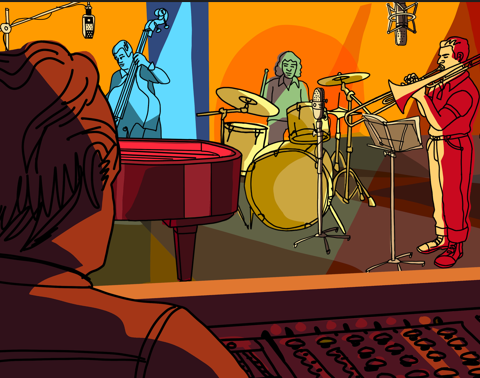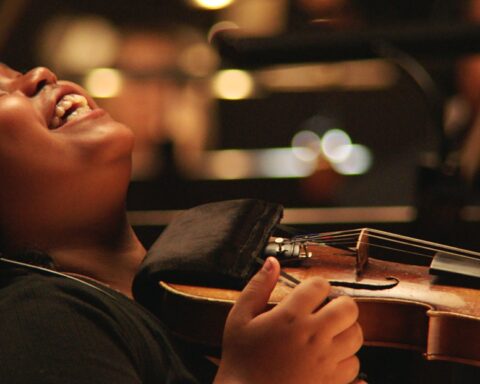MONTREAL–BASED FILM COMPOSER Robert Marcel Lepage is nothing if not prolific. Add to that charming, unassuming, affable, open, curious and kind. No wonder he’s the number one documentary film score composer of choice in Quebec. Lepage has been busy writing music for films for a quarter of a century and the sheer light that shines through his eyes quietly signals he has much more music in him to give. He has scored an astounding 300 films, 96 of which are Canadian; many of the rest are French or British. His current volume of productivity yields one to two dramatic features per year, in addition to an average of twenty docs. Simple math computes a creative output of one film score about every two to three weeks.
According to Lepage, “it’s never that clear-cut. All the films are in a different stage of a process. In a week I can work on four or five films at the same time. Sometimes it’s one hour on one film and 20 hours on another. I’m always scanning in my mind, ‘what should I do with this project and what should I do with that.’ Sometimes I write something for one and I think, ‘no it’s not good for that project, but it could be good for the other.’ That’s the advantage of working on multiple projects because it’s all about ideas.”
Lepage’s early musical identity was that of a free-jazz clarinetist. He studied at the Faculty of Music at the Université de Montréal. His musicianship defines his process. “I am an instrumentalist. I like to work with other people, so I hire a lot of musicians. I get into the studio and we work together. Sometimes we have to work for one film, so we have to produce a certain amount of music—and at the same time I have to edit another film. It’s different studios for different projects.” Lepage works with an assistant for the more technical computer mixing and finishing, because this man clearly prefers to compose.
Despite his varied professional careers (translator, graphic artist, construction painter…), Lepage insists that he only wears one hat, and that hat is as a composer. He counts his varied life experience as essential training in building his chameleon-like artistry. “It’s kind of like being a researcher or someone who works in a laboratory. But when you work in the field as a graphic artist, in advertising or as a translator, then you start to learn how people work and what kind of music they want to hear—and how you can approach different aspects of people. It’s very important and it’s very different from what I learned at university.”
Lepage’s “language” is that of improvisation, and his mother tongue in music is experimental jazz. From this framework he has the flexibility to adapt or apply more or less conventional or conservative methodologies as needed. Last summer, Lepage wrote a piece for the recently disbanded CBC Radio Orchestra. It’s only been for the past 15 years that Lepage has been one hundred percent a film composer. Lepage points out that what distinguishes him from a ‘regular composer’ who works with stage or orchestral music, is that “when you work for somebody else they don’t necessarily want your music. They want some music, and you have to be able to do any kind of music with a personal touch. You may have to write a string quartet or rock and roll or experimental music. It’s a different kind of approach compared to a composer who’s developed his own language.”
He has a sound sense of place and purpose about his craft: “I think one of the first things that you have to learn when you are a film composer is that it’s not a film music project, it’s a film project, and the music that you are writing is something that is part of a larger creation that is the director’s art. So I’m just the one who translates in music what he wants—what he expects.”
Lepage believes that there are two types of film directors: those who give you virtual carte blanche, like Magnus Isaacson, Pierre Hébert and Patricio Henriquez—“directors who are really open in a way that they like to be surprised”—and those that seek to control every aspect of the process. In his view, neither is good or bad; both present their own challenges and learning opportunities. “It’s the limitations that are interesting … when I’m very controlled by a person, then I have more access to his mind and what he wants to do. I like to work with very strong limitations because it’s like a chess game and it’s another section of my brain … Sometimes they make me do things that I wouldn’t have done or I wouldn’t have thought of—so this is the experimental part in me that speaks—I like to do things that I wouldn’t have done by myself.”
Not surprisingly, Lepage can count many instances where his creative voice was challenged. He wanted to use a string quartet for Francois Bouvier’s TV series, Urgence but the director insisted on hard rock mixed with an accordion. For the doc Le Magicien de Kaboul, Lepage envisioned strings and percussion, and perhaps electronica, while director Philippe Baylaucq was set on blues performed on Japanese, Afghan and American instruments. Another case in point was Bernard Émond’s feature film, La neuvaine. Here Lepage wasn’t allowed to write melody; his vocabulary was limited to chords and never more than two chords in a row. “He didn’t want to emphasize anything—to underline things. I had to produce sound that always stops, never has a melody, never progresses. It’s like Lego blocks. I found that it’s like working with colours more than music. I didn’t even have the possibility to work with dissonance, just pure chords. So I had to study very long: ‘what’s the difference between d minor and a minor’ and make sure that with just different inversions of the chords, you can create really strong differences.”
In terms of inspiration, Lepage maintains he has never had ‘composer’s block.’ “I’m always looking for different ways to make music. Sometimes you have an inspiration, sometimes it’s something that you found, sometimes it’s just working on something that you develop—there’s always something that you can do. By imitation, by contrast, it’s like a poet—you don’t have to wait for inspiration—you have all kinds of approaches you can use.”
In a non-egoist kind of way, Lepage admits he can write dozens of songs in virtually any style in one day. Last year Lepage worked with filmmaker Bernard Émond on a documentary about the nostalgia of Italian immigrants in Montreal. Sometimes he doesn’t even know where the music comes from himself: “inspiration is very easy for me. If I have to write old Italian or Greek or French songs, I don’t know where they come from, but all I have to do is “laissez le robinet couler” (which translates as ‘let the faucet run’). Literally the music just seems to pour out of this man.
Whether Lepage is writing for a doc or drama, in the end it all comes down to two things: money and emotion. Money is simple: as a rule, there’s more of it in a dramatic feature than a doc. Emotion tends to be more complex. “If in a feature an actor plays a person and there’s a drama…there’s no problem putting the emotion there. But if it’s a real person in a real situation, you have to be more subtle and discreet in a documentary … Working in documentary, you cannot underline everything, you have to find tricks to create the same thing—emotion—but it’s not the same technique.”
For Lina Moreco’s A Mort des Masques, a documentary about prisoners pleading for parole, Lepage tuned the music to the neon buzz of the lights in every cell. “It’s more subtle, [but] it creates the same emotion. It’s not as evident as in a feature … [where] you can put in swells of a string section. In a documentary, you cannot stress that much—what’s interesting is to have the idea—the way to create the emotion that you want, but not be that obvious.”
Drawing from his past life as a professional translator makes it easy for Lepage to straddle both Anglophone and Francophone worlds. It also gives him a somewhat unique perspective on the effects of language, both literal and musical, on filmmaking. “It’s very interesting to have this ‘changement de perspective.’ It’s all about language, and it’s about a certain type of grammar between those two languages, the documentary language and the film music language. And that’s what interests me—this relationship between image and sound and image and music, but in a larger context between the language of documentary and the language of music.”
Lepage spent three years working with a London-based docu-drama television producer. He spotted a few trends over that time: one of his observations about working in English is that Canadian Anglophone directors often mirror the docu-drama style that their fellow Brits helped define. He cites as an example Paris 1919, a docu-drama he’s currently working on with acclaimed Canadian Paul Cowan. Lepage relishes working in this blended genre: “It’s an excuse to use the bag of tricks of feature film music with the documentary.”
Another field note: French and French-Canadian filmmakers are very different in their approach to the medium than their Anglophone counterparts. Curiously, most of the French-Canadian feature filmmakers he works with, Catherine Martin, Benoît Pilon, and Bernard Émond, come out of the documentary tradition and bring that approach to their dramatic works. “It’s very interesting, because we work the same way we would work on a documentary film, but it’s all feature films. So the music is very discreet, subtle; it’s not at all this American type of wall-to-wall music … You have to produce the same amount of emotion without going to the bag of tricks.” Lepage’s experience of the British is quite the opposite, “It’s always bigger than life music for their documentaries.” Lepage attributes the cutthroat commercialism and competitive nature of the television market in the UK to this particular yen for musical sensationalism.
Lepage prefers more simple acoustical sounds, and feels the need to teach his sensibilities to the next generation. He is pro-active as an educator. “Most young composers do everything themselves with machines. I don’t think it’s a good idea. We don’t have to eliminate every musician in the process. Unfortunately that’s what is happening … It’s going away because of pressure on the budget and timeframes, which makes it more and more difficult to write and record and make music with real musicians.”
Lepage teaches improv at the Montreal Conservatory of Music. He also teaches at l’INIS, L’institut National de l’Image et du Son, where they train budding documentary filmmakers. Then he gets the two groups of young artists to work together. Tracking the tension between mixing live and digital, Lepage tries to “reintroduce musicians in the process.”
In terms of uncharted territory, Lepage has set his sights on the musical. He’s just started working on a series for young children where he has to write in 14 different songs an eclectic mix of all types of emotions from silly to sad, tension to joy. For Lepage, a well- versed multi-musical linguist, it’s the possibilities of the various languages he uses that make it worthwhile.










